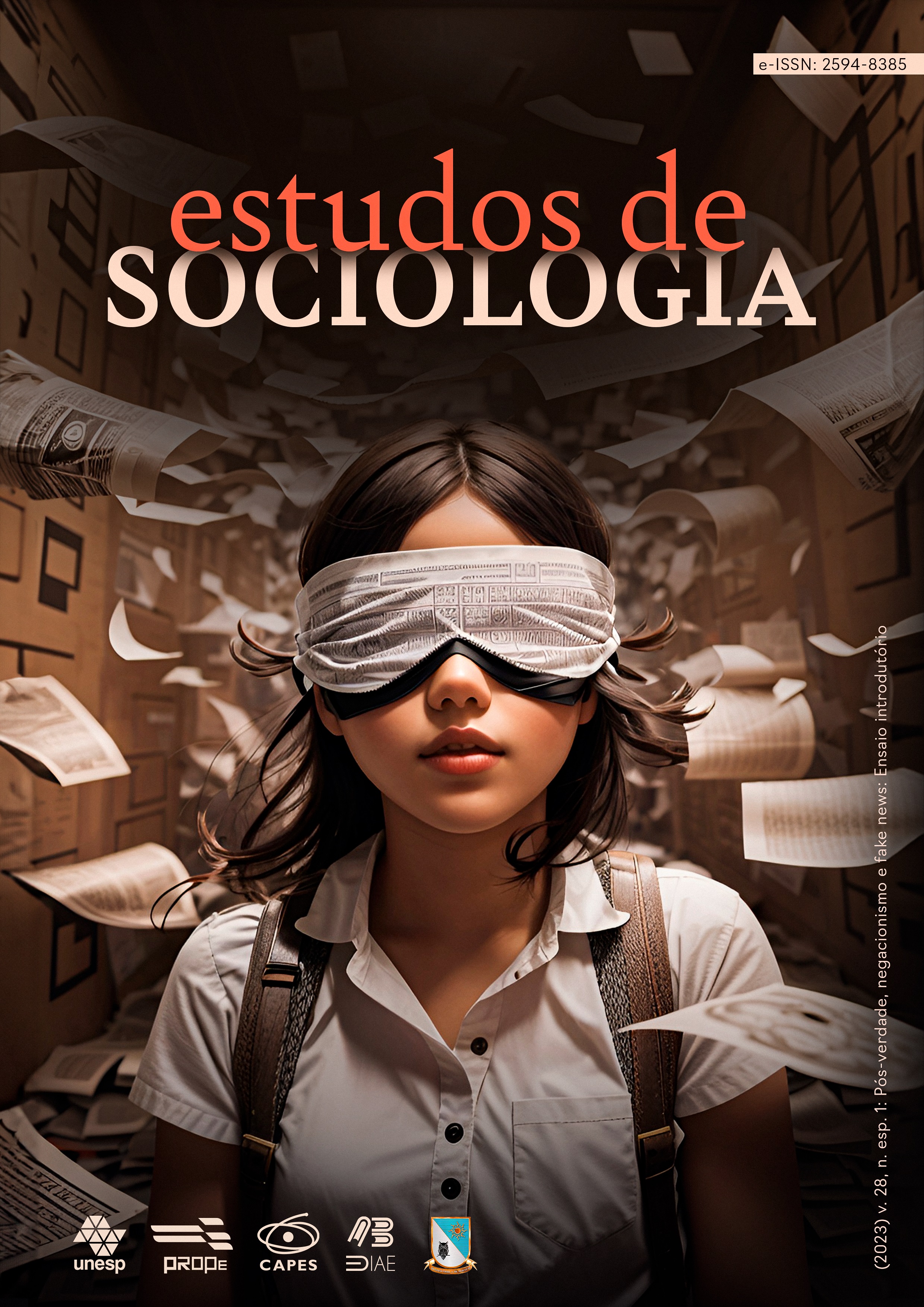Democratic power and “alternative facts”
DOI:
https://doi.org/10.52780/res.v28iesp.1.18266Keywords:
Truth, Fake News, Democracy, Critical theoryAbstract
The present paper presents a reflection on the concept of truth in relation to the ideal of democracy, especially in consideration of contemporary realities. In this way, the text is subdivided into sections that aim to contemplate some fundamental elements of this relationship for the 21st century, as follows: different understandings about the concept of truth; the ideal of democracy and the principles that should guide the democratic public sphere; the contemporary digital reality of this form of government, with new aspects (use of “bots”, microtargeting, and so on) and old problems (hate speech and the dissemination of fake news); the relationship between power and the adoption of "truths"; and the proposal of a critical theory of truth and democracy.
Downloads
References
ADORNO, T. W.; HORKHEIMER, M. Dialektik der Aufklärung. Frankfurt a. M.: S. Fischer, 1969.
ARENDT, H. “Wahrheit und Politik”. In: NANZ, P. (ed.). Wahrheit und Politik. Berlin: Verlag Klaus Wagenbach, 2006.
BRENNAN, J. Gegen Demokratie. Berlin: Ullstein Hardcover, 2017.
FINCHELSTEIN, F. A Brief History of Fascist Lies. Berkeley: University of California Press, 2020.
FORST, R. “Eine kritische Theorie transnationaler (Un-)Gerechtigkeit”. In: BOHMANN, U.; SÖRENSEN, P. (ed.). Kritische Theorie der Politik. Berlin: Suhrkamp, 2019a.
FORST, R. “Two bad halves don’t make a whole: On the crisis of democracy”. Constellations, v. 26, n. 3, p. 378-383, 2019b. Disponível em: https://onlinelibrary.wiley.com/doi/abs/10.1111/1467-8675.12430. Acesso em: 17 out. 2022.
FORST, R. Toleranz im Konflikt, Frankfurt a. M.: Suhrkamp, 2003.
FORST, R. Das Recht auf Rechtfertigung. Frankfurt a. M.: Suhrkamp, 2007.
FORST, R. Normativität und Macht. Berlin: Suhrkamp, 2015.
HABERMAS, J. Strukturwandel der Öffentlichkeit, neue Ausgabe. Frankfurt a. M.: Suhrkamp, 1990.
HABERMAS, J. Faktizität und Geltung. Frankfurt/M.: Suhrkamp, 1992.
HABERMAS, J. “Hat die Demokratie noch eine epistemische Dimension?”. In: HABERMAS, J. Ach, Europa. Frankfurt a. M.: Suhrkamp, 2008.
HAUGAARD, M.; KETTNER, M. (ed.). Theorising Noumenal Power. London: Routledge, 2020.
KANT, I. Grundlegung zur Metaphysik der Sitten. Berlin: Editora, 1903/11.
LEVITSKY, S.; ZIBLATT, D. Wie Demokratien sterben. München: Deutsche Verlags-Anstalt, 2018.
MAUS, I. Über Volkssouveränität. Berlin: Suhrkamp, 2011.
MILL, J. S. Über die Freiheit. Stuttgart: Reclam, 1974.
MOUNK, Y. Der Zerfall der Demokratie. München: Droemer Taschenbuch, 2018.
NIDA-RÜMELIN, J. Demokratie und Wahrheit. München: Beck C. H., 2006.
RAWLS, J. Gerechtigkeit als Fairness. Frankfurt a. M.: Suhrkamp, 2003.
RICHARDSON, H. “Non-Cognitivist Trumpism”. Journal of Social Philosophy, v. 50, n. 4, p. 642-663, 2019. Disponível em: https://onlinelibrary.wiley.com/doi/abs/10.1111/josp.12312. Acesso em: 17 out. 2022.
RUSS-MOHL, S. (ed.). Die informierte Gesellschaft und ihre Feinde. Köln: Herbert von Halem, 2017.
SCHMALZ-BRUNS, R. Reflexive Demokratie. Baden-Baden: Verlag: Nomos-Verl.-Ges., 1995.
WHITE, J.; YPI, L. The Meaning of Partisanship. Oxford: Oxford University Press, 2016.
Published
How to Cite
Issue
Section
License

À revista Estudos de Sociologia ficam reservados os direitos autorais pertinentes a todos os artigos nela publicados.
Os artigos publicados e as referências citadas na revista Estudos de Sociologia são de inteira responsabilidade de seus autores.
A Estudos de Socilogia utiliza a licença https://creativecommons.org/licenses/by/4.0/ (CC BY), que permite o compartilhamento do artigo com o reconhecimento da autoria.



